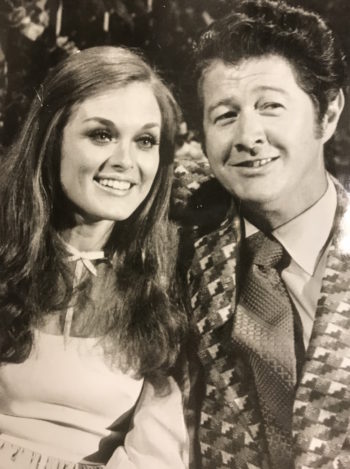
Gail Farrell and Dick Dale often sang duets together on television’s “The Lawrence Welk Show.” Photo courtesy of Mary Lou Metzger
By Robert Weast
With “Ah-one and Ah-two,” legendary bandleader Lawrence Welk would inimitably count off to start his orchestra. Following Welk’s downbeat was Dick Dale, a.k.a. Richard L. Dale, of Algona. Dale’s wholesome, pleasant image matched perfectly with Welk’s popular television show that can be seen in reruns each Saturday night on PBS: Americana at its best, an easy listening, exuberant presentation of happiness, smiles and “champagne music.” As Welk would say, “It’s wunnerful, wunnerful.”
This slick, showy production, was seen on television for 32 years, from 1951 to 1982. During that period, Dale appeared before tens of millions of viewers and sang and played at four Presidential Balls and in concert at Carnegie Hall. While Dale’s mainstay was playing baritone saxophone in the five-man sax lineup, he also sang with the great lead singers Alice Lon and Norma Zimmer, as well as with vocal groups. He even performed musical sketches and played Santa Claus at Christmas time. Eventually, he became part of the production staff of the Welk shows. During those 32 years, 1,065 weekly shows were produced; 85,200 costumes were used; 28,000 songs were sung; and there were 1,121 dances and 67 band players.
Dale was born on Sept. 14, 1926, in Algona. His career had its genesis when he took up the saxophone in seventh grade. He graduated from Algona High School at 16 years of age and when he was 18 he enlisted in the U.S. Navy in 1944 during World War II. He came down with rheumatic fever and was in a military hospital for six months. Dale had an older brother who was killed on a battleship in World War II. When Dale left the military, he returned to Algona to marry Marguerite Gappa in 1949 (who at age 89, still lives there). They had three sons, Rick, Danny and David, and a daughter, Dee Dee.
He began to play with several bands, such as the Six Fat Dutchman polka band, which was broadcast on radio out of New Ulm, Minn. Welk heard this broadcast and asked Dale to audition in Chicago, Ill. He was 25 years old in 1951 when he joined the Welk band in Clinton. This became a plum job, playing on television for three-plus decades and Welk paid his musicians top scale.
TO READ MORE ABOUT THIS STORY AND OTHER FASCINATING STORIES ABOUT IOWA HISTORY, subscribe to Iowa History Journal. You can also purchase back issues at the store.
